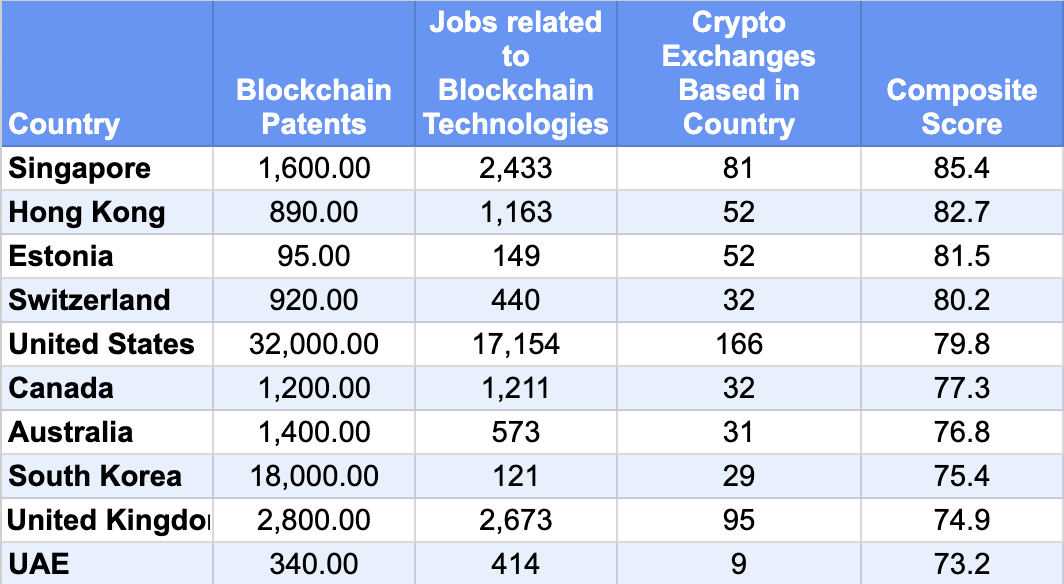A new report has ranked Singapore as the top country in blockchain and crypto technology.
The study evaluated countries using a composite index based on blockchain patents, blockchain-related jobs and the number of crypto exchanges. Each metric was weighted for significance, and the final scores were scaled from 1 to 100 for comparison.
Singapore is leading the global race in Blockchain and Cryptocurrency technology
Singapore achieved the highest score of 85.4, highlighting its leadership in blockchain innovation. The country has more than 2,400 blockchain-related jobs and 81 crypto exchanges, demonstrating its strong focus on workforce and infrastructure development.
Hong Kong followed closely with a score of 82.7. Its financial systems integrate blockchain seamlessly, support more than 1,100 blockchain-related jobs and host 52 crypto exchanges.
Estonia ranks third with a score of 81.5, showing impressive results despite its small population. The country produced 95 blockchain patents, supported 149 blockchain-related jobs, and maintained 52 crypto exchanges.
Switzerland secured fourth place with a score of 80.2. It is a leader in decentralized finance, offering 440 blockchain-related jobs and hosting 32 crypto exchanges.

Top 10 Blockchain Countries 2024. Source: ApeX.
Surprisingly, the United States ranked fifth with a score of 79.8. It registered 32,000 patents and offers more than 17,000 blockchain-related jobs. Additionally, there are 166 crypto exchanges operating in the US, making it a significant but slowing player in the global crypto space.
A 2024 developer report from Electrical Capital provides further insight into why the US has seemingly slowed the pace in the global blockchain race. The report shows that the US has lost 2% of its market share over the past five years, especially in emerging markets such as India, Ukraine and Southeast Asia.
“Thank you for collecting and sharing this data. It once again highlights that the United States is struggling to keep up with innovation due to outdated regulations,” said one user of the findings.
Canada, Australia and South Korea rank sixth, seventh and eighth respectively. Canada scored a score of 77.3, with 1,200 patents and jobs, reflecting its commitment to innovation. Australia achieved a score of 76.8 with 1,400 patents and 573 blockchain jobs. South Korea produced 18,000 patents, the second highest in the world, with a score of 75.4.
The United Kingdom ranks ninth with a score of 74.9 and offers 95 crypto exchanges and more than 2,600 blockchain-related jobs. The UAE rounded out the top ten with a score of 73.2, producing 340 blockchain patents and hosting 414 jobs in addition to nine crypto exchanges.
Emerging Blockchain Players
While established leaders like Singapore dominate the rankings, emerging markets are beginning to show promise in blockchain innovation. African countries such as Nigeria and Kenya are using blockchain to tackle issues such as financial exclusion and inefficient supply chains.
Latin America is another region gaining traction in blockchain adoption. Countries such as Brazil and Argentina are exploring blockchain for transparent governance, digital identity and stablecoins to combat economic instability. These countries are promoting innovation through regulatory sandboxes and pilot programs, which could help them rise in the rankings in future surveys.
Southeast Asia, outside Singapore, is also making progress. Vietnam and the Philippines are embracing blockchain for money transfers and decentralized finance, driven by strong technology adoption and high cryptocurrency usage.
Countries that invest in talent, infrastructure and regulations are shaping the future of digital innovation and transforming global industries. The ApeX spokesperson emphasized the importance of leading blockchain players in encouraging more countries to follow suit, stating:
“These leading countries are not only embracing the technology, but are actively shaping its future. Their efforts reflect a global shift towards decentralization and transparency,” an ApeX spokesperson told BeInCrypto.
As these countries continue to invest in infrastructure, workforce development, and regulatory clarity, the crypto space will evolve. Blockchain technology’s potential to reshape industries means this race is far from over and new leaders are likely to emerge in the coming years.

